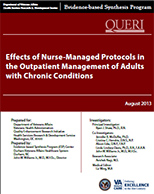
|
Principal Investigator:
Ryan J. Shaw, Ph.D., R.N. Evidence-based Synthesis Program (ESP) Center, Durham Veterans Affairs Healthcare System, Durham, NC
Washington (DC): Department of Veterans Affairs; August 2013 |
Download PDF: Complete Report, Executive Summary, Report, Appendices
Medical management of chronic illness consumes 75 percent of every health care dollar spent in the United States, and the provision of economical, accessible, and high-quality chronic disease care is a continuing concern across health care settings. Type 2 diabetes, hypertension, hyperlipidemia, and congestive heart failure are prime examples of common chronic diseases that cause substantial morbidity and mortality and require long-term medical management and support.
For each of these disease conditions, the majority of care occurs in outpatient settings where well-established clinical practice guidelines can be used to guide treatment decisions. Despite the availability of these guidelines, practice recommendations often are not implemented which contributes to suboptimal clinical outcomes. The shortage of primary care clinicians in outpatient care settings has been identified as a barrier to the provision of comprehensive chronic disease care and provides an impetus to develop and test strategies for expanding the roles and responsibilities of other members of the interdisciplinary team to help meet the continually increasing need for chronic disease care.
In an effort to serve more Veterans and improve the quality and efficiency of chronic disease care, the Department of Veterans Affairs (VA) is implementing Patient Aligned Care Teams (PACTs)—a model of primary care transformation that builds on other widely disseminated efforts such as the chronic care model. VA PACTs are adaptations of the patient-centered medical home, which includes the following core principles: wide-ranging, team-based care; patientcentered orientation toward the whole person; care that is coordinated across all elements of the health care system and the patient's community; enhanced access to care that uses alternative methods of communication; and a systems-based approach to quality and safety. VA PACT clinical teams may include nurses (registered nurses [RNs] or licensed practical nurses [LPNs]) as well as primary care providers, clinical pharmacists, behavioral health specialists, and clinic facilitators. An organizing principle for these care teams is to utilize personnel at the highest level of their skill set. The Institute of Medicine has recommended the expansion of nurses' roles and responsibilities to allow them to practice to the full extent of their education and training.
Reports of the contributions of nurses in improving access and quality of care for patients with selected chronic conditions by using detailed structured protocols developed by or through consultation with physicians began in the late 1960s. There is now robust evidence supporting the effectiveness of nurses in providing patient education about chronic disease treatment, selfcare management, and secondary prevention strategies as well as the ability of nurse practitioners (NPs) to provide effective and cost-effective primary care. As the largest segment of the health care workforce, nurses are ideally suited to collaborate with other professionals in meeting the increasing demand for chronic care. Nurses are experienced and accustomed to working in multidisciplinary teams and, with clearly defined clinical protocols and additional training, safely practice beyond their usual scope of practice and may well be able to order relevant diagnostic tests, adjust routine medication regimens, and appropriately refer complicated or unstable patients for further medical evaluation.
The VA is in the process of developing protocols and policies expanding the nurse's role as a member of PACT teams. A protocol contains a series of actions in accordance with current clinical guidelines or standards of practice that are implemented by nurses to manage a patient's condition. At the VA, there is emerging interest in allowing nurses to practice in an expanded role that includes medication initiation or titration under guidelines of protocols. The lack of certainty regarding outcomes associated with the use of clinical protocols by non-NP nurses in expanded roles led the VA to commission this evidence synthesis. We thus synthesized the current literature to describe the effects of nurse-managed protocols for the outpatient management of adults with high-impact, chronic conditions such as type 2 diabetes, hypertension, hyperlipidemia, and congestive heart failure (CHF).
We addressed the following key questions: